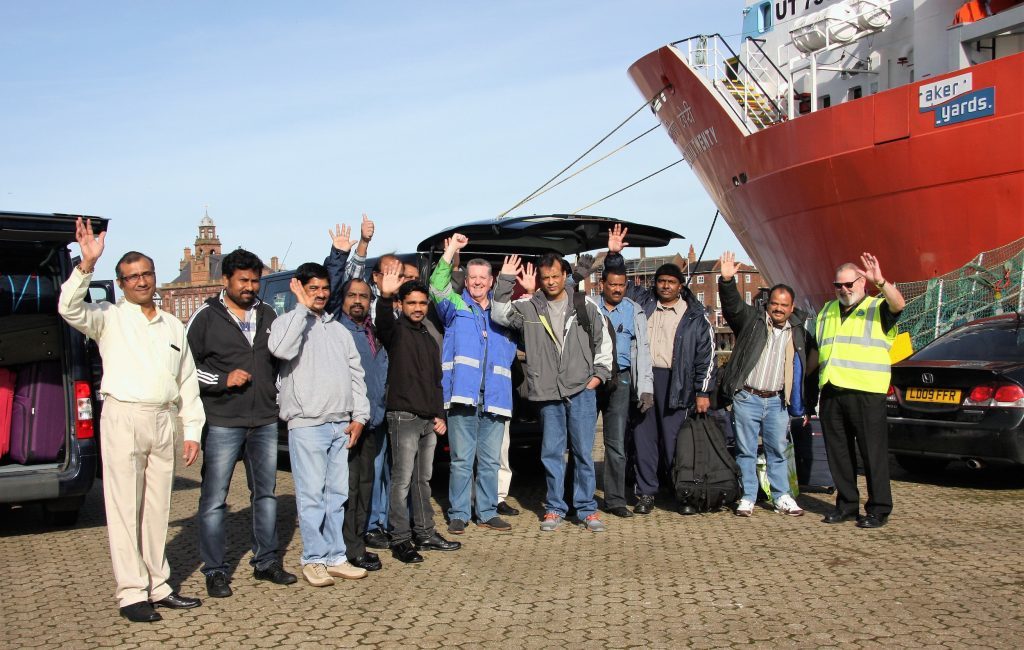
Foreign nationals left stranded on an offshore supply vessel in Great Yarmouth are now on their way home – complete with all the wages they were owed.
But their fellow crewmen in Aberdeen remain cut off from their families and without wages.
Both the Malaviya Seven in Europe’s energy cpaital and the Malaviya 20 in Great Yarmouth have been docked since they were stopped by the UK Maritime and Coastguard Agency last year.
The boats and their crews were effectively “abandoned” by their Indian owners after being detained by the coastguard over owed wages, according to the International Transport Workers’ Federation.
However, the ITF secured a victory for the 12 strong crew of the Malayvia 20 with the wages finally paid and the men allowed to return home.
ITF inspector Paul Keenan said: “The Malaviya 20 arrived in Great Yarmouth on June 2016. It was detained by the Maritime and Coastguard Agency primarily because of owed wages.
“The company initially paid some of the owed money and some of the crew were repatriated. Then nothing. So in December we arrested the vessel on the crew’s behalf.
“The bank which owned the ship contacted us and sent a representative over to meet with the ITF in January. They agreed to pay all owed wages to the crew currently on the vessel and those who had left earlier.
“The bulk of the wages were paid by bank transfer, and the rest was paid in cash on board the vessel last Friday. In all $689,679 was paid to a total of 33 crew who were owed wages dating back to October 2015.”
Negotiations were carried out on behalf of the workers’ by the International Transport Federation (ITF) to collect the payment from GOL Offshore.
The ITF has assisted both ship’s crews from the outset and it was routine ITF inspections that first revealed problems with the vessels and that the crews were not paid.
Keenan added: “Thanks to their determination, the support of the local community and port chaplain, organisations such as the MCA, and the ITF itself, the men have finally achieved justice.
“In the time when they were abandoned some had taken loans out so that their families could survive. One had taken five loans out at 16 per cent interest which he managed to pay off when he got his wages.
“One seafarer, whose son had to live with neighbours because the money lenders kept coming to the house for their money, has now paid off the loans and his son has moved back in. Another crew member, who found it difficult to speak to his son because he was so upset every time as he had to lie to him, telling him he would be home soon, told him last week he would be home this week.
“He was overcome with joy. He had also sponsored three children in his village to go to school, and had had to stop this when he didn’t get paid.
“He has already started to sponsor them again and they are now back at school. It seems life is getting back to normal for them. They all said that what they need now is to spend some time will family and friends before they think about going back to sea.”
Meanwhile the crew of the detained sister ship the Malaviya Seven remain stranded in Aberdeen. The ITF is moving to arrest the vessel on the crew’s behalf in order to secure for them the wages and tickets home to which they too are entitled.
At the time the vessels were seized it was described by the RMT union as “modern day slavery”.
General Secretary Mick Cash said: “These ships of shame are a blatant abuse of migrant workers and are contrary to any number of stated industry and government objectives around human rights
and maximising economic recovery from our resources.
“Additionally it is a catalyst for the dumping of UK seafarers, many thousands of whom are now drawing benefit from the state.”
Recommended for you
